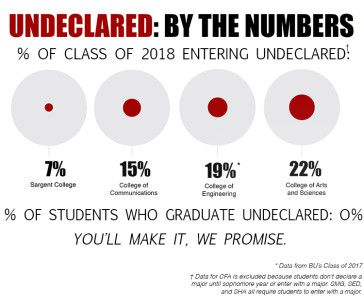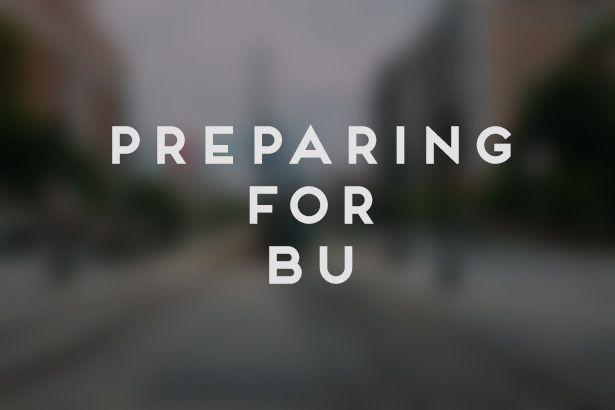
For many students, choosing a major upon entering college can be a daunting task. At a time when teenagers are often expected to have an idea of what they want to pursue for the rest of their lives, some feel pressured to declare a major at the start of freshman year. Though many entering freshman choose a major, the reality is that a large portion of students enroll at Boston University undeclared and use resources offered by the university to find a course of study that appeals to them.
Students can enter undeclared in most schools and colleges at BU, including the College of Arts and Sciences, College of Communication, College of Engineering, Sargent College of Health and Rehabilitation Sciences, the School of Visual Arts in the College of Fine Arts and the College of General Studies.
For the Class of 2018, about 22 percent, or 430 students, are entering CAS without a declared major, said Kerry Buglio, assistant dean for CAS Advising and Academic Services.
“It’s completely fine for students to come in undeclared and delay finalizing their decision on a major,” Buglio said. “In fact, many students who come in with a major declared change their mind along the way. Undeclared students are keeping their options open.”
In most schools, students are expected to declare their major by the end of the second semester of their sophomore year.
When it comes time to choose a major, particularly in the liberal arts, a student’s decision will not necessarily limit them from entering a given field, Buglio said. Rather, the student will have a set of marketable skills that can be applied to a variety of occupations.
“Students who study the liberal arts and sciences do specialize in a subject – their major – but also have completed a curriculum that encourages strong writing skills, proficiency in a foreign language, critical thinking, analysis and problem solving,” she said. “A major is just one piece of what students present for their next step after earning their B.A. [Bachelor of Arts degree].”
To fulfill their general requirements in CAS, students may opt to take part in the Core Curriculum, a program of eight courses surveying the liberal arts in small, discussion-based seminars, according to the Core Curriculum website.
CAS also offers a one-credit, pass/fail course called First Year Experience, FY 101. This small discussion-based class, conducted by an upperclassman mentor and a BU faculty member, allows freshmen to learn how to maximize the quality of their time spent at BU, including how to choose a successful academic pathway, according to the course description.
Another option for students who are still unsure of what they want to study is the College of General Studies, a two-year program that teaches a broad core curriculum intended to help students become well-rounded and find their area of interest, according to the CGS website. After two years in the program, CGS students will transition into any of the other colleges at BU to complete their four-year bachelor’s degree.
A team of three full-time professors teaches the college’s cross-disciplinary core classes to about 80 students focusing on humanities, natural sciences, rhetoric and social sciences, according to the site. Each of these professors will also engage one-third of the students in weekly discussions about their academic progress and students meet once a week with academic advisers.
Regardless of the school or college that a student enters undeclared, there are many resources to assist them in eventually choosing a major.
In the College of Communication, for example, most students gain a solid foundation in all areas of communication by taking COM CO 101: The World of Communication during the first semester of their freshman year, said COM Assistant Dean of Student Services Micha Sabovik.
“This type of overview course is a good way for students to learn a lot about the intertwined nature of communication fields and, at the same time, gain some insight into the different areas of study available to them at COM,” she said.
Sabovik said throughout the academic year, COM also offers events such as guest speakers, panels and networking events.
“We encourage our students to attend these events to help them explore various career paths,” she said. “Most of these events feature alums speaking about what they do day-to-day and what they did [during college] to help them attain their current position.”
COM faculty, career services and professional advising staff are also available for students to narrow down the field of communication that interests them most and how to pursue that track in college, Sabovik said.
It is also possible to transfer between schools and colleges at BU. Each program has different requirements in order to make the transition and students are encouraged to make an appointment with an academic adviser and check out the Intra-University Transfer policy sheet.
Graduate schools and potential employers look for an array of qualifications in candidates, including not only their major but their minors, internships, jobs, extracurricular activities, professional organization memberships and other experiences, Buglio said.
“Most undeclared students I have worked with have a wide variety of interests and skill sets,” she said. “Undeclared students should not feel that being undeclared is simply a lack of major. It is an intentional choice to take time to explore all that BU has to offer. They have lots of company in their peers and lots of support and guidance along the way.”
Rising sophomore Josh Mosby enrolled as an undeclared student in CAS, but he intends to declare his major in environmental science at the start of the fall 2014 semester. He said resources such as the monthly newsletter sent out to undeclared students, which highlights one of their peers who started as undeclared and then decided on a major, helped him during his first year at BU.
“This was inspiring, because I could really relate,” he said. “I had no idea where I wanted to be.”
Mosby said his academic adviser recommended that he take a variety of classes to explore different interests. He said his diverse course load, including mathematics, science, language and literature courses in his first semester, helped him discover his passions.
“I just realized which one I liked the most,” he said. “Your grades will reflect what you’re good at and also what you’re passionate about.”
Mosby said his extracurricular involvement in BU’s Student Government and Environmental Science Department also helped him decide on a major.
“I was nervous at the end of first semester when I thought I wasn’t going to have a major, because I thought I was going to be behind and have to take summer classes and maybe overload, but that’s not the case,” he said. “There’s enough time and there’s enough room in your schedule. In the end, you will choose a major and you will graduate. There’s no way that you’re going to get through college and not choose a major, so just be open.”

















































































































